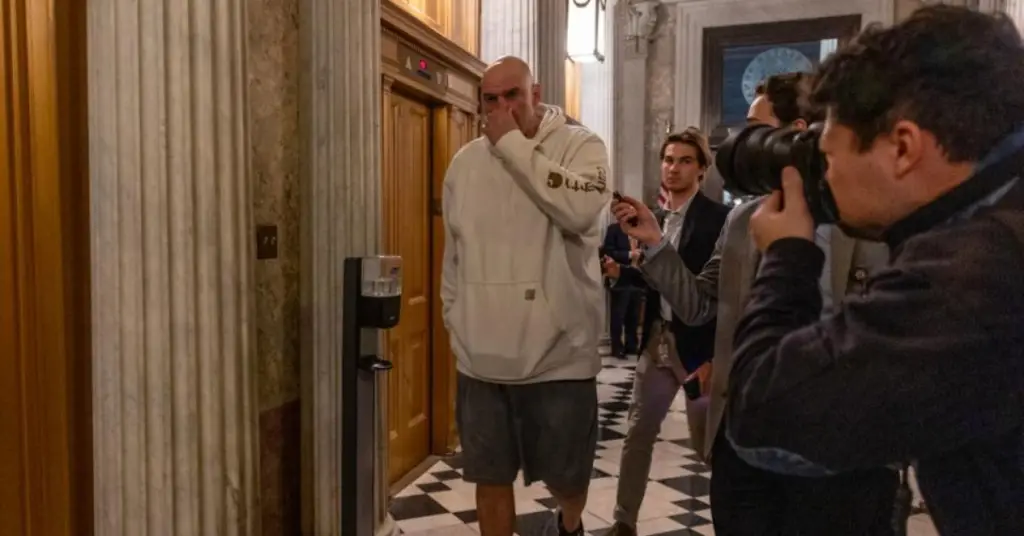Pennsylvania Senator John Fetterman made headlines for a brave and open decision—he checked into a hospital for treatment of clinical depression. At the time, this was seen as a moment of real courage. Many praised him for helping break the stigma around mental health, especially in politics, where such honesty is rare. But now, in 2025, that positive image is under serious threat.
A new, detailed article published in New York Magazine’s Intelligencer by journalist Ben Terris has revealed troubling details about Fetterman’s behaviour, mental health, and decision-making since his return to office. The report has sparked shock among Democrats and ignited calls for his resignation.
A Profile That Changed the Mood
The article pulls together accounts from Fetterman’s former and current staff, including his ex-chief of staff, Adam Jentleson. It paints a picture of a senator who continues to battle the demands of his role, both emotionally and physically. Staffers claim that behind closed doors, Fetterman struggles with emotional control, shows signs of instability, and may not be receiving the help he needs to recover fully.
According to the report, Fetterman—who suffered a stroke during his Senate campaign in 2022—continues to use technology like transcription devices to help with speech and hearing. While he appears fine in press conferences and public interviews, insiders claim that his private moments tell a different story.
The article describes moments of emotional distress, confusion, and even physical danger. One major incident that came to light is a car accident in May or June of 2024. Fetterman reportedly ignored staff concerns and drove himself, only to fall asleep behind the wheel. The crash injured his wife, Gisele.
This was not made public at the time. Its recent revelation has added fuel to the debate about whether he is fit to serve.
Heated Arguments, Mental Struggles, and Political Drama
In addition to the car crash, the article outlines frequent, intense arguments between Fetterman and his wife, especially over political topics such as Israel’s military campaign in Gaza. According to Terris, there were moments where Fetterman became emotionally overwhelmed, such as locking himself in his office, crying during FaceTime calls with staff, and threatening to skip Senate votes.
He reportedly had a major breakdown in January, shortly after Trump’s second inauguration. One incident involved Fetterman wrestling with whether to support Trump’s controversial defence nominee, Pete Hegseth. Staffers said he seemed overwhelmed and unstable during that period.
Fetterman responded to some of these claims by saying, “My no vote on Pete Hegseth speaks for itself. The rest is pure conjecture.”
But the issue didn’t stop there.
Before the 2024 car crash, former chief of staff Jentleson had written a letter to Fetterman’s medical team. He warned them that the senator was showing signs of mental health decline and reckless behaviour. He believed Fetterman was slipping back into a dangerous state.
In response, Gisele Fetterman strongly denied these claims. She told the magazine that Jentleson had shared “scary, untrue stories” and accused him of trying to damage her husband’s reputation.
Political Reactions: Supporters Divided, Critics Loud
The fallout from the article has been intense. Some Democrats and political commentators are calling the article a hit job. Former Senator Kyrsten Sinema described it as a “despicable hit piece.” Blogger Matthew Yglesias suggested that people shouldn’t use Fetterman’s mental health against him and instead look at what has worked in his career.
But many others see the situation differently.
Jonathan Last of The Bulwark, who had once supported Fetterman and even suggested he run for president, now says he should resign. On a podcast, Last called the new revelations “career-ending.” His co-host, Sarah Longwell, agreed.
Progressive political strategist Rotimi Adeoye echoed the call for resignation. “The only solution is political: Fetterman should resign,” he wrote. “PA Democrats need a robust primary.”

Mehdi Hasan, a well-known progressive commentator, also criticised Fetterman and urged other Senate Democrats to read the article and respond to it publicly.
Some voices from Pennsylvania recalled older incidents, like the time in 2013 when Fetterman pulled a gun on a Black jogger, saying the senator has a troubling past. “John Fetterman doesn’t deserve sympathy,” wrote activist Tanisha Long on social media.
Others expressed concern for Fetterman’s family. Blogger Will Stancil posted, “His wife needs to leave. My heart really breaks for her.”
A Senator’s Legacy at Risk
This new spotlight on Fetterman’s mental health and behaviour comes at a time when Democrats are trying to build momentum ahead of the next election cycle. His recent voting record—including backing some of Trump’s controversial nominees—has already disappointed many in his own party.
His enthusiastic support for Israel’s Gaza campaign also triggered a backlash from progressive voters, who saw his stance as aggressive and out of touch. Critics accused him of ignoring the suffering caused by the war.
The big question now is: can John Fetterman continue to serve in such a high-pressure, demanding position while dealing with ongoing mental health challenges?
His earlier openness about depression had helped reduce stigma and inspired many. But if the recent claims are true, and if he continues to put himself and others in danger, like with the reported car crash, his position may no longer be defensible.
Mental Health in Politics: A Larger Debate
The Fetterman case has opened up wider discussions about mental health in politics. Is it possible for someone to deal with serious mental health struggles and still serve effectively? Where is the line between compassion and accountability?
Fetterman’s story is not just about one man. It’s about how we handle health, pressure, and power in the political system.
Some believe this article is a warning sign that must be taken seriously. Others fear that it could discourage future leaders from being honest about their mental health. Either way, it’s a conversation that the Democratic Party—and the country—must now face head-on.
What’s Next?
As of now, Fetterman has not indicated any plans to resign. Democratic leaders have mostly stayed silent, perhaps waiting to assess public reaction. But the pressure is building fast.
If more revelations emerge—or if voter trust continues to erode—it may be only a matter of time before stronger political action is taken.
For now, all eyes remain on John Fetterman, as the public watches how he, his family, and his party respond to the storm surrounding him.
Disclaimer: This article has been meticulously fact-checked by our team to ensure accuracy and uphold transparency. We strive to deliver trustworthy and dependable content to our readers.




